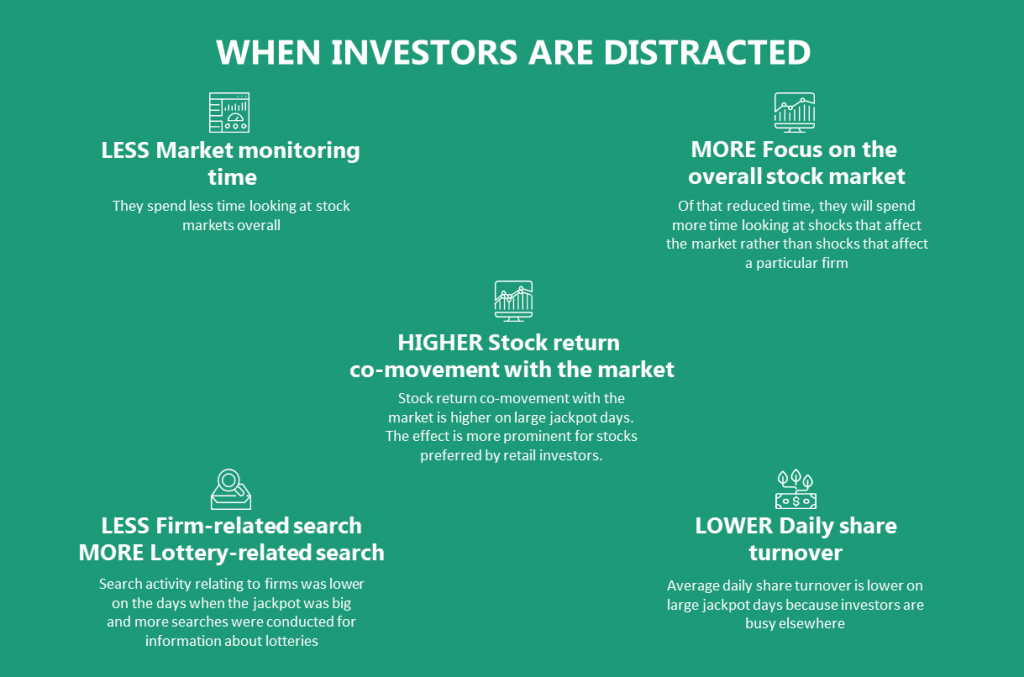
The Cost of Distraction
Distractions are everywhere in our always-on, always connected world. Our focus at work, as well as our play and relaxation time, has been ambushed by ploys aimed at distracting our attention for commercial gain. The hard-to-resist temptation to click on an ad that is cunningly aligned to our preferences also plays on the fear of missing out that marketers have been adept at honing in on. Many man hours and millions of research dollars have been spent on measuring the level of distraction in the workplace and working out the costs to employers.
Other, less well-documented costs can also result from distractions. Consider for example the attention of investors in the stock market. What could be the result if some compelling opportunities were potentially lucrative enough to distract their attention from monitoring the stock market? What kind of opportunity could be compelling enough to do that? And could such a distraction have an impact on the stock market while they were neglecting to monitor it?
Researchers have been looking at this kind of distraction, called “rational inattention,” with interest, and for good reason. After all, if you can identify the specific triggers of changed investor behaviour that impact stock movements, that could give you an edge as an investor.
One of the latest studies on this topic was written by Dr Shiyang Huang, Ms Yulin Huang and Professor Tse-Chun Lin of the HKU Business School. Their paper, entitled “Attention allocation and return co-movement: Evidence from repeated natural experiments”, was published by Journal of Financial Economics in 2019. Their topic of research was studying what happens when lotteries with big jackpots distract investors’ attention from the stock market.
Most investors pay close attention to how the firms they invest in are performing in financial markets. That’s a strategy that makes good sense if you’re an investor. Yet investors, particularly retail investors, do not always behave rationally. Sometimes perceived opportunities to make money outside the world of financial markets can be tantalizing enough to make investors change their behaviour. The researchers wanted to find out if those changes could affect the performance of firms’ stocks.
The lure of lotteries
One of those tantalizing opportunities are lotteries that offer the potential for big wins. If you have ever chosen to buy a lottery ticket because the prize has grown so big, then you are well placed to understand the lure of the lotteries.
Lotteries have widespread appeal around the world, and Hong Kong is a prime example. The local lottery in Hong Kong is the Mark Six, which is run by the Hong Kong Jockey Club. The biggest ever lottery win recorded in Hong Kong was on December 10 in 2013 when one lucky winner won almost HK$91 million. Punters seem not to be deterred by the high odds against winning the jackpot, which are 139,836,160 to 1, according to a report in the South China Morning Post. For the lucky winner, the prize is a life-changing amount of money for a minimal investment and the small amount of effort needed to buy a ticket.
A single lottery ticket purchase may not of itself affect the markets, but if enough investors are tempted by the possibility of big, fast wins to divert enough of their time and attention from monitoring stocks to monitoring lotteries, then they can contribute to changes in the stock performance of the firms they usually invest in.
Finding a winning combination
The researchers in this study decided to focus on three Taiwanese lotteries, which have three characteristics that relate to the subject of the study. First, Taiwan’s lotteries have already been shown to affect investor behaviour by, for example, reducing the amount of time investors spend on stock market research because they are reading about big lottery prizes, discussing lotteries with their friends, or queueing to buy tickets. As in Hong Kong, big jackpots in Taiwan occur when there is no winner or only a partial winner and the pot is carried over into subsequent draws so that the jackpot gets bigger and bigger until it is won. The system means that large jackpots are probably impossible to predict and are not likely to be linked to market factors. And finally, Taiwan’s stock market investors are made up of mainly retail investors, who the researchers believe are more likely to be attracted by big jackpots.

Their expectations turned out to be right. The results of the study showed that when they are not distracted, retail investors tend to pay more attention to market movements, which affect multiple firms, than to information that is specific to a single firm. Similarly, when investors are distracted from monitoring financial markets, they spend less time looking at stock markets overall, and of that reduced time, they will spend more time looking at shocks that affect the market rather than shocks that affect a particular firm. This change in attention has a noticeable impact on asset prices because it means that on days when there is a big jackpot on offer, more information about market shocks feeds into asset prices than on other days. In a phenomenon known as co-movement, on days when there are big jackpots firms’ stock returns turn out to be more closely aligned with market prices compared to days with no big jackpots.
For their research purposes, the researchers treat the occurrence of a big jackpot—of around US$15 million or more—as a market shock that has the power to distract investors’ attention from their normal market monitoring. They measured share turnover on big jackpot days and found that average daily share turnover is lower on large jackpot days because investors are busy elsewhere. They also checked and compared the volume of searches on Google in Taiwan on different days and found that search activity relating to firms was lower on the days when the jackpot was big and more searches were conducted for information about lotteries. The results also supported the theory that the stocks most affected by these changes are the ones that retail investors usually buy, as these are the same kind of investors most likely to be attracted by large jackpots.
Winner takes all
Of course, for most of the investors who are distracted by lotteries, the distraction doesn’t result in a win. Very occasionally, though, distractions do pay off, perhaps especially when coupled with perseverance. On January 22 this year, excitement among punters in Hong Kong was high after the special Chinese New Year Mark 6 lottery resulted in no winner of the jackpot, meaning that the jackpot for the next draw on January 26 rose to HK$43 million. There was no winner for that one either, bringing the next jackpot on January 29 to HK$52 million. Again, the jackpot remained unwon, and the pot rose again for the February 2 when finally one winner took home a jackpot of more than HK$63 million.
The rising tension from draw to draw may have distracted the winner from many other things, but in this case, it was surely worth the wait. For those who didn’t win, it could be that the mounting excitement and the seductive dream of becoming an instant multimillionaire was worth their time and energy. In any case, the next draw is not far away.
About the Research







